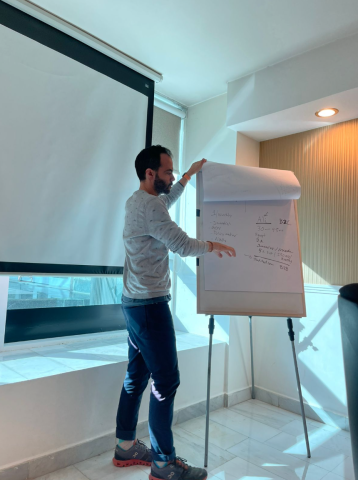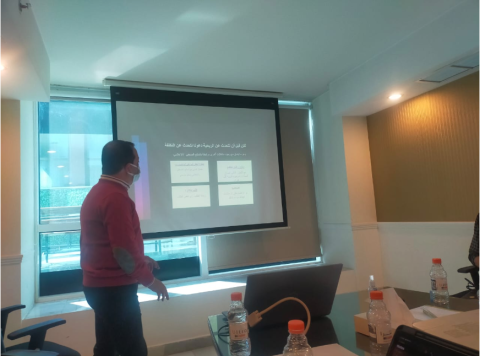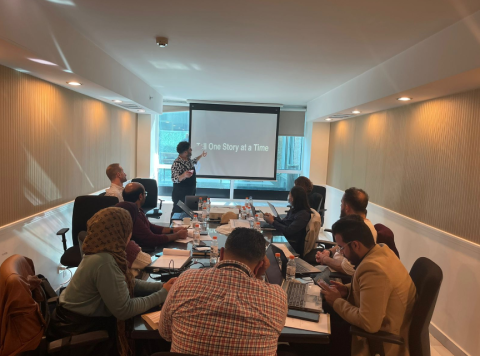Amid growing threats presented by authoritarianism, disinformation, a lack of funding, and more, independent media globally struggles to stay afloat. The challenges facing journalism are especially acute in the Middle East and North Africa.
In this climate, media entrepreneurs must be equipped with the requisite skills and tools to navigate their news outlets and projects toward sustainability, while continuing to meet the needs of their audiences.
With support from the National Endowment for Democracy, ICFJ's IJNet Arabic Mentoring Center for Media Startups in the Middle East and North Africa has worked with more than 70 media entrepreneurs since launching in 2014, helping them develop their media platforms and improve their financial sustainability.
“The Mentoring Center is an important part of the journalism ecosystem in the MENA region,” said the CEO of the Sowt podcast platform and one of the program’s mentor’s, Ramsey Tesdell. “Supporting new ideas and young journalists is a key part of building a sustainable and professional sector. While the challenges may seem significant, this important work goes beyond skills and training, providing the building blocks for a better tomorrow.”

Tesdell presents during the Mentoring Center boot camp.
For the first time this year, mentees received grants during the course of the program to develop dedicated sub-initiatives through their media outlets. Upon the Mentoring Center’s conclusion in April, the mentees received seed funding to continue to grow their media outlets in strategic ways.
“The program works with the participants on long-term plans based on each one's needs and expertise, helping build a mentality of a distinguished entrepreneur in various media fields," explained fellow mentor Ahmed Esmat, director of the Alexandria Media Forum. “One of the most important outcomes of the latest round is the mentees’ ability to turn adversity into opportunities, as happened with mentees from Yemen and Iraq.”

Esmat presents during the Mentoring Center boot camp.
Here’s more on the six media entrepreneurs who took part in the 2022-23 Mentoring Center, and their promising initiatives.
Qoboul Al-Absi, Yemen
Qoboul Al-Absi is the chairperson of the Qarar Foundation for Media and Sustainable Development, which trains Yemeni journalists on investigative and data journalism.
Among her accomplishments during the mentorship program, Al-Absi teamed up with the Media Freedoms Observatory, the Cultural Media Center, and the Urgent Action Fund for Women’s Human Rights to hold a training for women journalists on digital security. Al-Absi used the grant she received during the program to organize a training for 30 Arab journalists on how to use open source information in their reporting.
“I was able to develop a strong brand and learn how to create a work plan to identify strengths and weaknesses which allowed me to reinforce my professional abilities, engage audiences, achieve sustainability, and communicate effectively with funders,” said Al-Absi.
Syrine Abidi, Tunisia
Syrine Abidi is a podcast producer and citizen journalism trainer. She runs the feminist journalism lab, Kortable, which publishes podcasts and documentaries on human rights, entrepreneurship and environmental awareness, among other topics.
Abidi was awarded a grant during the program to produce a podcast series she named "Environmental Mic," for which she interviewed entrepreneurs interested in climate change and the environment.
Ahmed Shawky Elattar, Egypt
Based in Egypt, Ahmed Shawky Elattar manages a media platform called Ozone, which covers issues related to climate change in Egypt and the greater Middle East.
Ozone formed seven media partnerships over the course of the program, while also publishing six investigations that looked into the threat of flooding in cities around the world. Elattar received a program grant to carry out a training on climate reporting for 35 journalists from 15 countries.
“I was able to develop a long-term strategy for my project, a short-term work plan, understand donor needs, and build partnerships,” said Elattar. “Within a year, I attended over 30 local and regional events, and the platform was mentioned in more than 30 news stories.”
"I have developed a business model and used various ways to achieve financial sustainability," said Abidi. “I was able to build a partnership with Radar Newsletter to fact-check false news, and work on a podcast in Arabic to promote media education and literacy, and verify false news for children.”
Abidi also connected with Mentoring Center alumna Samira Dehri, from Algeria, to interview women experts from Tunisia and Algeria about issues related to women and other human rights, the environment and technology for a collaborative podcast.

Mentoring Center boot camp training session.
Sayf Ali, Iraq
Sayf Ali runs the independent Akad News, which uses multimedia to produce fact checks and news reports. Ali was able to grow his team and expand Akad News’ audience and reach during the Mentoring Center, he explained.
“After producing visual and textual news reports and stories, my media project got big engagement on social media,” he said. “The team expanded, and new reporters, photographers and editors joined us. The Iraqi Journalists Syndicate officially recognized us, and we had a partnership with The Checker platform.”
With the grant Ali received during the program, he and his team produced a guide on the right to access information in Iraq.
Ahmed Atef Ramadan, Egypt
Investigative journalist Ahmed Atef Ramadan is behind Radar Newsletter, the first of its kind focused on fact-checking content in Egypt.
During the program, he launched new social media accounts for his newsletter which has more than 2,800 subscribers today. He also produced a series of special edition newsletters, on the Men’s World Cup, climate reporting during COP27, and economic literacy.
Ramadan’s involvement in the Mentoring Center helped him think more like an entrepreneur, he explained, and better understand his audience and their needs. He was able to expand his newsletter’s reach, strengthen its brand, and identify a more coherent vision for future plans.
“I have officially founded a company, expanded the audience to be from many countries internationally, not just from Egypt, and I was able to get new financial resources," said Ramadan.
Rabi Abuhassan, Jordan
A Jordanian journalist living in Dubai, Rabi Abuhassan manages an independent outlet called RaienTV, which aims to produce meaningful human and community-centered stories that document the achievements of underrepresented people and marginalized communities.
“I consider the mentorship period as the stage of my professional media awareness that helps me to build bridges toward people’s concerns,” said Abuhassan. “I became more mature in terms of digital media work, and I feel the interaction and admiration of the public interested in the content of Raien.”
Main image courtesy of Rabi Abuhassan.
This article was originally published by IJNet's Arabic site. It was translated to English by Lina Elshrief.